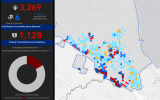
Redwood City — The County of San Mateo has completed the second stage of its Digital Inclusion project by expanding their SMC Public WiFi network into the Woodland Park Apartment community located on the westside neighborhood of East Palo Alto.
In partnership with property owner Sand Hill Property Company, this project will provide free County internet access to over 1800 units of affordable, rent-controlled apartments with over 4,000 residents, including 223 K-12 students from the Ravenswood City Elementary, Belmont Redwood Shores, Las Lomitos Elementary, Redwood City Elementary, and Sequoia Union High public school districts. The newly expanded SMC Public WiFi network went live on November 20, 2020.
As part of the County’s Public WiFi expansion, nearly 70 SMC Public WiFi network access points were installed across the Woodland Park Community to optimize the number students, families, and members of the local community who will be able to safely and successfully distance learn and access the internet from home or nearby.
"As a father of three children, I look forward to the free WiFi program at Woodland Park. I feel that this program will help the whole family in this new way of doing school," said resident Tomas Carrillo Ponce.

“We’re excited to partner with the County to help provide free internet access for our residents and neighbors, and help local students with online learning,” said Michael Kramer from Sand Hill Property Company, who leads their work in East Palo Alto. “We’re a community-oriented housing provider, and we’ve been very impressed with the community-oriented approach by County staff and their partners.”
Since its launch in 2014, the County of San Mateo has been connecting people to the Internet through its free-to-access SMC Public WiFi network at over 100 locations, including parks, community centers, and public spaces throughout the county. This latest expansion continues the goals of the SMC Public WiFi Project to bring connectivity to underserved communities, support educational opportunities for students, spur local economic development, and provide greater access to County services.
“SMC Public WiFi is a core component in connecting students and residents who depend on online access for remote schooling or remote working. Our experience over the past five years in building and operating this network has allowed us to quickly expand SMC Public WiFi in response to the urgent needs of the community,” said County Chief Information Officer Jon Walton.
The importance of Internet access was amplified by the “stay at home” mandates arising from the COVID-19 pandemic. While many residents were able to work or learn from home, there were San Mateo County residents who were not able to do so because they lack broadband service at home. This “digital divide” threatens the socioeconomic well-being of these residents, as well as the educational development of many K-12 students.
“Internet access is essential for students to have a fair chance at an education,” said Gina Sudaria, Superintendent of the Ravenswood City School District.
“Without access to online learning and other resources, these at-risk residents will quickly fall behind in their education and in life,” said Board of Supervisors President Warren Slocum who represents the Fourth District.
Today’s expansion of the SMC Public WiFi network is part of a Digital Inclusion pilot initiative created in March 2020 to connect “unconnected” San Mateo County students in four school districts so that they can participate in online learning for the 2020-2021 school year. The County used a data driven approach to identify parts of the county that had the highest number of K-12 students with reported connectivity issues.

This initiative is supported by a public private partnership composed of the County of San Mateo, the San Mateo County Office of Education, four school districts, property owners including Sand Hill Property Company/Woodland Park Communities, Columbia Property Trust/University Circle, and technology service providers Kaizen Technology Partners, Strategy of Things, SmartWave Technologies, and telecommunications service providers Comcast and T-Mobile.
Columbia Property Trust provided the County access to install wireless hardware equipment that relays internet signal to the nearby Woodland Park community. “This is a tremendous opportunity for University Circle to leverage the property’s infrastructure to help the County and the citizens of East Palo Alto,” said Michelle L. Goudeaux, Senior Manager with Columbia Property Trust, which owns and manages University Circle. “WiFi access is something many people in Silicon Valley take for granted, however, more so now in the post-COVID environment, access to WiFi is a critical lifeline for people to be able to work and keep up with their studies.
“The San Mateo County Public WiFi project is the anchor public sector project for a comprehensive digital equity platform Kaizen Technology Partners is bringing to market in 2021. We have been thrilled with the rapid iterative progress we’ve made along San Mateo County and SMC CIO Jon Walton, and we are excited to transcend the status quo in communities, counties, and states all across America through new digital platforms, paradigms, and partnerships,” said Dao Jensen, CEO of Kaizen Technology Partners.
This SMC Public WiFi network expansion was funded using part of the $6.3m from the Coronavirus Aid, Relief, and Economic Security (CARES) Act grant to provide students in four school districts (Ravenswood City School District, La Honda-Pescadero Unified School District, Sequoia Union School District, and the Redwood City Elementary School District) with Internet access for online learning.
The first stage of the Digital Inclusion initiative, launched in August 2020, funded broadband service subscriptions for a total of 650 qualifying students in the Ravenswood City School District and the La Honda-Pescadero Unified School District. The broadband services are being offered by Comcast, T-Mobile and Verizon. Subsequent stages of this initiative, to be completed by the end of 2020, include the further expansion of SMC Public WiFi network, and the establishment of the County’s first-of-its-kind “Park and Connect” mobile sites providing on-demand wireless service throughout the county.